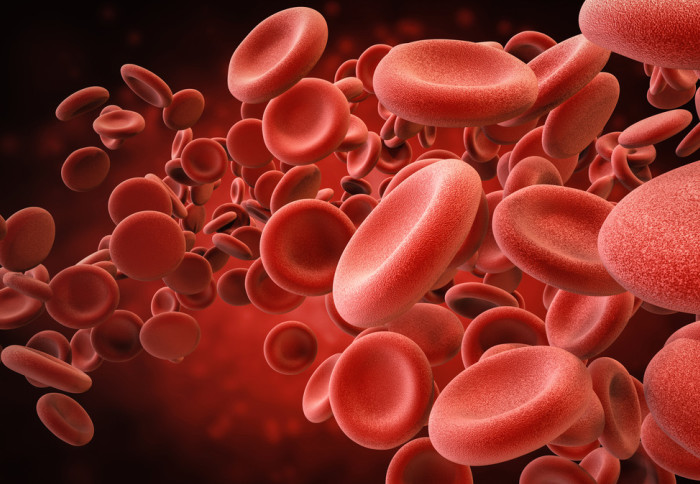Raised iron levels linked to reduced life expectancy
by Ryan O'Hare

Iron is key for making red blood cells. But disrupting the balance can lead to a host of health problems
Having too much iron in the body puts your long term health at risk but it could also take years off your life.
These are the findings of a study using large scale genetic data to assess the impacts across a population of having naturally raised levels of iron, in terms of years of life expectancy.
According to the researchers, the findings – which help to cut through the noise caused by confounding factors such as age, sex or diet – add to the increasingly complex picture of iron’s role in our health and highlight the risks of having raised levels of iron.
Dr Dipender Gill, from Imperial’s School of Public Health and who supervised the study, said: “We have known for a long time that having too much or too little iron in your system can have serious impacts on your health, and that effectively modifying iron levels can help many people with underlying conditions.
“Our findings build on previous work to clarify that picture further, showing that people who have genetic predisposition to slightly raised levels of iron in the body have reduced life expectancy on average. While we did not look directly at the impact of taking supplements, our results suggest that there is a need to better understand the health implications of people boosting their iron levels with supplements when they don’t need to.”
Double-edged sword
Iron is used by the body to make red blood cells, which carry oxygen. Most people without underlying health conditions should be able to get enough iron from their diet. But disrupting the balance can lead to a host of health implications: too little iron is associated with fatigue and impaired immune system, while too much can cause liver failure, and in high enough doses can even be fatal.
Our results suggest that there is a need to better understand the health implications of people boosting their iron levels with supplements when they don’t need to Dr Dipender Gill Imperial College London
A number of studies suggest small changes in iron levels can have protective and detrimental effects for different diseases, such as heart disease, stroke and infections. But the net effect of varying iron levels on life expectancy remains unclear.
In the latest study, published this month in the journal Clinical Nutrition, Dr Gill and Mr Iyas Daghlas from Harvard Medical School used a statistical technique called Mendelian randomization to try to explore the effect of increasing levels of iron on health – using people’s genetic variation as an indicator of their iron levels.
The researchers trawled genetic data from almost 49,000 people to find genetic variants linked to iron levels. They focused on three points in the genome where a single ‘letter’ difference in the DNA – called a single nucleotide polymorphism (SNP) – can slightly increase or reduce a person’s iron level.
When these same SNPs were then screened in a larger dataset combing lifespan data for more than one million people, they found that the genetic markers for higher iron levels on average associated with reduced life expectancy.
The analysis revealed that for every one point of standard deviation increase in genetically predicted serum iron above baseline, people had an estimated 0.7 fewer years of lifespan.
Furthermore, the findings were unlikely to be biased by lifestyle factors.
A body of work
The work builds on a number of previous studies by Dr Gill, which have used genetic data to investigate the role of iron in hundreds of diseases.
A 2017 study revealed the link between high iron levels and lower risk of heart disease. Further studies from 2019 showed naturally higher iron levels were associated with a lower risk of high cholesterol levels, reducing the risk of arteries becoming furred with a build-up of fatty substances, but also carried with it a higher risk of blood clots and skin infections. Taken together, the studies build a complex picture of iron status in health.
The authors stress that the genetic markers themselves do not indicate reduced life expectancy or risk in the wider context, but are a tool to study how iron levels relate to health without the influence of a number of complex confounding factors such as diet, economic background, or smoking status. They add that the findings should not currently be applied clinically, at the individual level.
Dr Gill explained: “It’s important to put these findings in context. Our analysis is indirect and uses genetic data as a proxy for raised iron levels. But the clinical implications warrant further investigation and could be important for long-term health at the population level.”
Mr Iyas Daghlas, from Harvard Medical School, said: “These findings should not yet be extrapolated to clinical practice, but they further support the idea that people without an iron deficiency are unlikely to benefit from supplementation, and that it may actually do them harm. We emphasize that these results should not be applied to patient populations with a compelling reason for iron supplementation, such as patients with symptomatic iron deficiency anaemia, or in patients with heart failure.”
-
‘Genetically predicted iron status and life expectancy’ by Iyas Daghlas and Dipender Gill is published in Clinical Nutrition. DOI: 10.1016/j.clnu.2020.06.025
(2017) The effect of iron status on risk of coronary artery disease: a Mendelian randomization study’ by Gill, D. et al, is published in Arteriosclerosis, Thrombosis, and Vascular Biology.
https://www.imperial.ac.uk/news/180489/low-iron-levels-linked-with-increased/
(2019) 'Effects of Genetically Determined Iron Status on Risk of Venous Thromboembolism and Carotid Atherosclerotic Disease: A Mendelian Randomization Study' is published in the Journal of the American Heart Association.
https://www.imperial.ac.uk/news/192055/higher-iron-levels-boost-heart-health/
Article text (excluding photos or graphics) © Imperial College London.
Photos and graphics subject to third party copyright used with permission or © Imperial College London.
Reporter
Ryan O'Hare
Communications Division